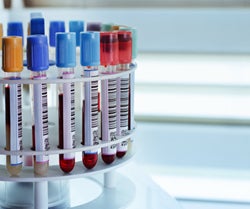
Improving treatment decisions for patients regarding Gleevec therapy
In 2001 the Federal Drug Administration (FDA) approved the drug Gleevec™ as a firstline therapy for treating chronic myeloid leukemia (CML). To date results have been impressive — over 90 percent of the patients who received Gleevec responded well to treatment, with many experiencing complete remission. Yet the remaining 10 percent failed to respond at all to Gleevec, or experienced slight improvement before developing a resistance to the drug and relapsing.
Researchers at the University of California, Los Angeles, have discovered key mutations that are predictive of Gleevec activity and resistance. Disclosed in 2001, the Gleevec Pharmacogenomic Test was developed by Mercedes Gorre, Neil Shah, John Nicoll, and Charles Sawyers. Initial research was funded by the National Institutes of Health.
The Gleevec Pharmacogenomic Test can be used to accurately determine whether CML patients will respond favorably to Gleevec. In 2005 the university licensed this biomarker technology to Genzyme, which manufactures a diagnostic test that can quickly identify patients who are likely to respond to Gleevec, as well as those who are likely to develop resistance to the drug. Physicians and clinicians using this test will be able to make earlier and more effective treatment decisions for their patients regarding Gleevec therapy.
